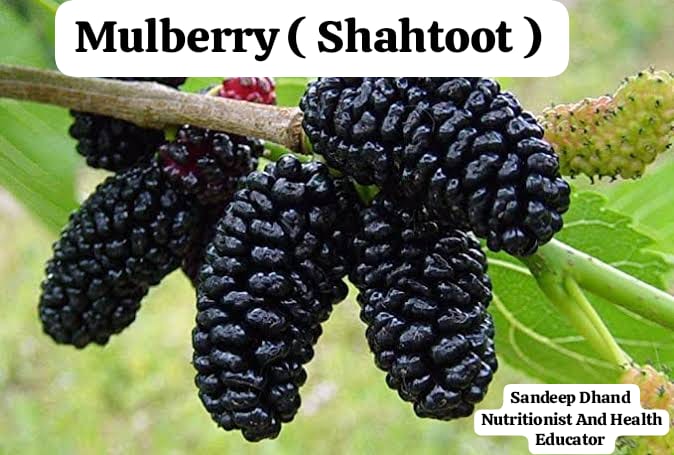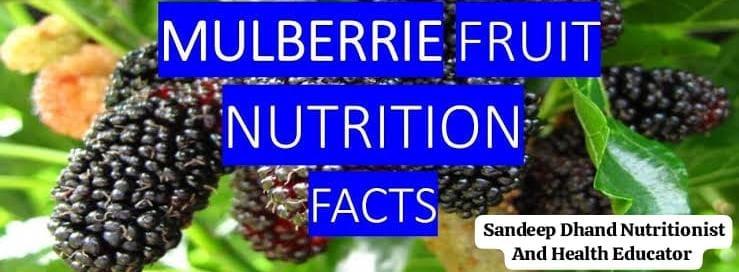Sandeep Dhand
Nutritionist And Health Educator
Introduction
Shahtoot, known as mulberry in English, is a delicious and nutritious fruit widely consumed across the world. It grows on mulberry trees, which belong to the genus Morus. These small, juicy berries are often available in different colors, such as red, black, and white, depending on the variety. But is Shahtoot just a fruit, or does it have additional benefits? In this article, we will explore everything about Shahtoot, its nutritional value, health benefits, and why it deserves a spot in your diet.
What is Shahtoot?

Yes, Shahtoot is a fruit. It grows on mulberry trees, which are cultivated in many parts of the world, including India, China, and the Middle East. Mulberries are not only enjoyed for their sweet and slightly tangy flavor but are also famous for their medicinal and nutritional properties. They can be consumed fresh, dried, or as juice, jams, and desserts.
Nutritional Value of Shahtoot

Shahtoot is not just tasty; it is loaded with nutrients that are essential for good health. Here is a breakdown of its nutritional profile per 100 grams of fresh mulberries:
Calories: 43 kcal
Protein: 1.44 grams
Carbohydrates: 9.8 grams
Fiber: 1.7 grams
Sugar: 8.1 grams
Fat: 0.39 grams
Vitamin C: 36.4 mg (61% of the daily requirement)
Vitamin K: 7.8 mcg (10% of the daily requirement)
Iron: 1.8 mg (10% of the daily requirement)
Calcium: 39 mg
Potassium: 194 mg
Mulberries also contain smaller amounts of vitamin E, magnesium, phosphorus, and antioxidants like resveratrol, which have powerful health benefits.
Health Benefits of Shahtoot


- Boosts Immunity
Shahtoot is a rich source of vitamin C, which is a natural immune booster. Regular consumption can help protect the body from infections and improve overall immunity.
- Improves Digestion
The fiber in mulberries aids digestion by promoting healthy bowel movements and preventing constipation. It also supports gut health by nourishing beneficial bacteria.
- Supports Heart Health
Mulberries contain antioxidants like resveratrol, which help reduce bad cholesterol (LDL) levels and improve heart health. Potassium in mulberries regulates blood pressure, reducing the risk of heart diseases.
- Helps in Managing Diabetes
Shahtoot has natural compounds that slow down the breakdown of sugars in the gut, which helps in maintaining stable blood sugar levels. This makes it a good fruit for people with diabetes when consumed in moderation.
- Enhances Skin Health
The antioxidants and vitamin C in Shahtoot help fight free radicals that cause skin aging. It promotes collagen production, which keeps the skin firm and youthful.
- Promotes Eye Health
Mulberries are good for the eyes as they are rich in vitamin A and other antioxidants. These nutrients protect the eyes from damage caused by free radicals and reduce the risk of cataracts and macular degeneration.
- Strengthens Bones
With calcium, iron, and vitamin K, mulberries support bone health by improving bone density and reducing the risk of osteoporosis.
- Aids in Weight Loss
Low in calories and high in fiber, Shahtoot is an excellent snack for those looking to manage their weight. It keeps you full for longer and curbs unhealthy cravings.
- Detoxifies the Body
Mulberries have a natural ability to detoxify the liver and kidneys, improving their function. The high water content also helps flush out toxins from the body.
- Fights Anemia
Shahtoot is a good source of iron, which is essential for producing red blood cells. It can help combat anemia and improve energy levels.
How to Include Shahtoot in Your Diet
Here are some simple ways to enjoy this fruit:
Fresh: Eat mulberries raw as a snack or dessert.
Juice: Blend fresh mulberries with a little water for a refreshing drink.
Smoothies: Add Shahtoot to your smoothies for a sweet and tangy flavor.
Jam: Make mulberry jam to enjoy with bread or chapati.
Salads: Add them to fruit or green salads for an extra burst of flavor.
Dried Mulberries: Snack on dried mulberries or use them as a topping for yogurt or cereal.
Precautions While Consuming Shahtoot
While Shahtoot has many benefits, it is important to keep the following points in mind:
Moderation: Consuming too many mulberries can cause digestive discomfort due to their high fiber content.
Allergies: Some people may be allergic to mulberries. Start with a small amount to check for any adverse reactions.
Diabetes: Although helpful in managing blood sugar, overconsumption can have the opposite effect.
Shahtoot in Traditional Medicine
In Ayurveda and traditional Chinese medicine, Shahtoot has been used for centuries to treat various ailments. It is believed to have cooling properties, making it ideal for treating heat-related conditions. It is also used to improve blood circulation and boost energy.
Interesting Facts About Shahtoot
Mulberry leaves are the primary food source for silkworms, which are essential for silk production.
The fruit stains easily, so handle it carefully to avoid marks on your clothes.
Mulberries have been cultivated for thousands of years and were highly valued in ancient civilizations for their medicinal properties.
Conclusion
Shahtoot, or mulberry, is much more than just a tasty fruit. Its rich nutritional profile and numerous health benefits make it a valuable addition to your diet. Whether you enjoy it fresh, dried, or in the form of juice, Shahtoot can significantly contribute to your overall health and well-being. So the next time you see mulberries at your local market, don’t hesitate to grab some and enjoy their goodness!